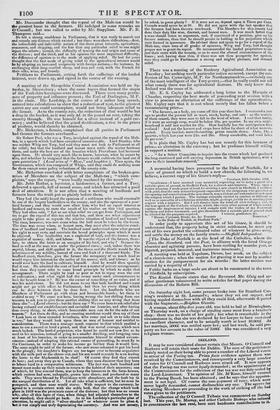There was a meeting of the Banbury Agricultural Association on
Tuesday ; but nothing worth particular notice occurred, except the con- fession of Mr. Cartwright, M.P. for Northamptonshire,—certainly one of the most intelligent of the Tory gentry,—that he really could not tell what remedy there was for agricultural distress. He only knew that Ireland was the cause of it.
Mr. E. S. Cayley has addressed a long letter to the Marquis of Chandos, respecting the best mode of proceeding next session with a view to procure an alleviation of the sufferings of the agriculturists. Mr. Cayley says that it is not wheat merely that has fallen below a remunerating price-
" The farmers, as a body, are worse off this year than last. I ventured a year ago to predict the present fall in wool, stock, barley, and oats : as the scarcity of them ceased, they were sure to fall to the level of wheat. I said that barley, if it were an average crop, would be below 23s. per quarter. In my Own neigh- bourhood it sold last market for 21s. How fearfully has the anticipation been realized ! And yet the harvest and crops have fallen far short of what were ex. pected. Every matket, notwithstanding, prices tumble down. Oats, 14s. a quarter, which last year were 21s. and 26s. Sheep unsaleable, and wool Lilo] 25 per cent."
It is plain that Mr. Cayley has but one remedy for this lowness of price—an alteration in the currency; but he professes himself willing to support a motion.
• . " for a Select Committee to inquire into the causes which had produced the long-continued and still existing depression in British agriculttne, with a view to their immediate removal,"


























 Previous page
Previous page